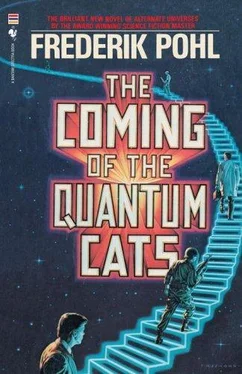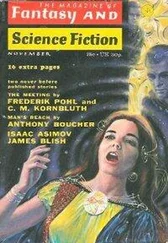Frederik Pohl - The Coming of the Quantum Cats
Здесь есть возможность читать онлайн «Frederik Pohl - The Coming of the Quantum Cats» весь текст электронной книги совершенно бесплатно (целиком полную версию без сокращений). В некоторых случаях можно слушать аудио, скачать через торрент в формате fb2 и присутствует краткое содержание. Год выпуска: 1986, ISBN: 1986, Издательство: Bantam Books, Жанр: Фантастика и фэнтези, на английском языке. Описание произведения, (предисловие) а так же отзывы посетителей доступны на портале библиотеки ЛибКат.
- Название:The Coming of the Quantum Cats
- Автор:
- Издательство:Bantam Books
- Жанр:
- Год:1986
- ISBN:9780553763393
- Рейтинг книги:5 / 5. Голосов: 1
-
Избранное:Добавить в избранное
- Отзывы:
-
Ваша оценка:
- 100
- 1
- 2
- 3
- 4
- 5
The Coming of the Quantum Cats: краткое содержание, описание и аннотация
Предлагаем к чтению аннотацию, описание, краткое содержание или предисловие (зависит от того, что написал сам автор книги «The Coming of the Quantum Cats»). Если вы не нашли необходимую информацию о книге — напишите в комментариях, мы постараемся отыскать её.
The Coming of the Quantum Cats — читать онлайн бесплатно полную книгу (весь текст) целиком
Ниже представлен текст книги, разбитый по страницам. Система сохранения места последней прочитанной страницы, позволяет с удобством читать онлайн бесплатно книгу «The Coming of the Quantum Cats», без необходимости каждый раз заново искать на чём Вы остановились. Поставьте закладку, и сможете в любой момент перейти на страницу, на которой закончили чтение.
Интервал:
Закладка:
Madame President had got clean away.
In the first hot dawn light I hitched a ride back to the Sheraton in a White House van, incongruous among the prisoners and guards in my rented tux.
We were going to have to fight for it.
The tear in the screen was tiny. All it let through at first was air, tinged with the viny smell of tomatoes and the sweet, grassy odor of growing corn. They were noticed only as curiosities, in the huge sprawl of Levitt-Chicago, where no crops had grown for twenty years. Then a bird drifted through, unnoticed. It fluttered around, looking unsuccessfully for its nestlings. It never found them. Birdlike, it went about its business of eating and excreting. It made no change in the world at all . . . except that, back in its own time, it had eaten seeds from the kudzu vines. When it dropped them in an ungardened patch of weeds they grew; and for a century afterward that whole section of Illinois was plagued with the sturdy, migrating, unconquerable invasion of kudzu.
27 August 1983
0940 Dr. Dominic DeSota-Arbenz
As soon as the pulseur was airborne and the seatbelt sign went off I was up and running. There was a woman in a purple muumuu who slipped into the aisle just ahead of me, with a quick flick of a triumphant look over her shoulder. But that was all right; she was only heading for the W.C. I was first in line for the phone.
Actually I got there too fast. When I dialed home I got a busy signal, because we weren't at cruising height yet and the pilot hadn't relinquished his disposable radio channels. I kept dialing. I was impatient. I'd been away too long. The first time I went through to another time my wife had kept me awake all the night before with worries—she remembered all too well what had happened to Larry Douglas. But that jump was physically near, at least—Sklodowska Curie was less than six kilometers from my front door, and that first trip, going to Rho-time, I'd just popped in and popped out again, mostly to test the new suit.
I make it sound easier than it was. I was scared too. But then when we began narrowing down our searches to the times that were actually getting somewhere with paratime research, or at least theoretical quark physics, the area of exploration began to increase geographically too. Beta had a facility just south of San Francisco. Phi had one in Red Bank, New Jersey. It was pop through a portal, pop Out, jump on a pulseur, fly a few hours, pop through another portal . . . and I had a wife and a child I really would have liked to see.
The third time I dialed my number I heard the beepers putting me through, and Dorothy was home. She picked up the phone on the first ring. I was never gladder of anything than to see her sweet, calm face peering out at me from the phone.
"You're looking real good, Do," I told her. She inspected my picture at the other end. Because the camera lens on our home phone is over the screen she had a sort of unfocused look, as though she'd forgotten her glasses, but she saw sharply enough.
"I wish I could say the same for you, hon," she said. "Is it going badly?"
I couldn't tell her just how badly over an open phone, but she didn't have to be told. She could see my face. I said, "Middling awful. How's Barney?"
"Missing his daddy, otherwise all right. He cut a tooth." I'd caught her with a cup of coffee in her hand, and she took a sip, looking at me. "It's not just that there's that, uh, problem," she decided. "There's something else on your mind. What is it, Dominic?"
I said, surprised, "You're right, Do. I feel—funny. I don't know why."
She nodded. I was only confirming what she knew. When Dorothy Arbenz came to the institute as an apres-doc psychologist I saw at once that she was beautiful, quickly learned that she was very understanding. It only occurred to me later that for the rest of my life she would be reading my mind, or next thing to it, but I married her anyway. She left my subconscious to worry about what I was worrying about and changed the subject. "Are you coming home now?"
"I wish. It isn't a Sklodowska matter any more, hon."
"You're going to Washington?"
" 'Fraid so."
She took a deeper swallow of coffee. I'd begun to be able to read Dorothy's mind a little, too, so I knew what was coming next. "Are you going through again?" she asked.
I didn't answer directly. "It isn't up to me any more," I reminded her. She knew it wasn't an answer, and she knew, as well as I did, that if I went through again, it wouldn't likely be just a little prowl around to see what was going on.
So I blew her a kiss, and she blew me one back, and after I'd hung up I sat before the phone for a moment, thinking about what it was that was worrying me.
I knew what it was. I'd known it at once, I just hadn't wanted to think about it.
There were too many mes.
When I was skulking around Tau and Epsilon I'd seen other Dominic DeSotas, but it wasn't until we had three of us in the same room that the wonder—the grisly, spine-twitching astonishment and dread—really reached me. I mean, they were me. Not the one me I'd lived with all my life, but the mes that I might have been—that, in their times, I was. I could have been born into a time when science was a dirty word, and wound up a thirty-five-year-old juvenile, furtively sneaking embraces with a coeur-douce I couldn't afford to marry, terrorized by my own government, whipped into line by an oppressive social system that made me ashamed of my own nudity. I could, in fact, have been the Nicky DeSota the back of whose head I could see, a dozen rows ahead, and in some sense I was him. Or I could have given up science for politics and turned out a United States senator. Well, that wasn't awful. It was a pretty good life— wealth, power, the esteem of all who knew me-but there was a sleaziness to it too. There he was, or I was, sneaking into a hole-and-corner adulterous relationship with another woman, because I had a wife I no longer loved and could not rid myself of without terrible heartbreak and recriminations, not to speak of financial and political ruin.
Or I could have taken the military road, like my other avatar the Major, who prided himself on deception and brute-force conquest or I could have died early, for one reason or another, as seemed to have happened to the Dominic DeSota in Rho.
And all those mes were me.
It was scary. It threatened the stability of my life in ways I had never felt before. Everybody always knew that things could have been very different for him somehow . . . but it was a whole other thing to know that, somewhere, they had.
I gazed out at the two of them. Even from a dozen rows back I could see that Nicky was having the time of his life in the big widebody, half empty with the light Saturday traffic of the week before Labor Day. So was the senator. I admired them for taking so much joy in what was around them, in spite of the fact that they were both, as far as they knew, marooned in a time as alien to their own as Mars . . . of course, I hadn't come from where they had just come from.
The other thing I could see was that the executive type in 32-C, the one who had already begun spreading out the contents of his attache case onto his tray, the empty seat beside him, and its tray, was casting irritable glances at the phone.
I turned back and made my other call.
I didn't go through the switchboard at the Sklodowska-Curie Institute. I dialed Harry Rosenthal's private line, and, as expected, when I got him on the phone the wall behind his face was not the one in Chicago; call-forwarding had tracked him to where he was. "You're in Washington," I said.
"Damn right," he fretted. "Waiting for you. Getting calls every five minutes from the Army and the science secretary and the CIA. I wish you were here now, Dom!"
Читать дальшеИнтервал:
Закладка:
Похожие книги на «The Coming of the Quantum Cats»
Представляем Вашему вниманию похожие книги на «The Coming of the Quantum Cats» списком для выбора. Мы отобрали схожую по названию и смыслу литературу в надежде предоставить читателям больше вариантов отыскать новые, интересные, ещё непрочитанные произведения.
Обсуждение, отзывы о книге «The Coming of the Quantum Cats» и просто собственные мнения читателей. Оставьте ваши комментарии, напишите, что Вы думаете о произведении, его смысле или главных героях. Укажите что конкретно понравилось, а что нет, и почему Вы так считаете.












